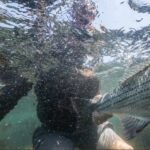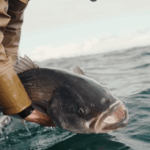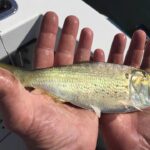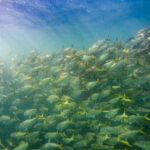
No, Striped Bass Are Not “Back” in North Carolina
This week, an Axios Raleigh article made the rounds claiming there may have been a
Congressman Huffman, Chairman of the Water, Oceans, and Wildlife sub-committee of the House Natural Resources Committee, held an event at the Baltimore Aquarium last Friday. Congressman Huffman was visiting the area to listen to concerns from fishermen and scientists in the Mid-Atlantic region.
The session was organized to ask a panel of experts what we could do better for our fisheries, specifically related to the Magnuson-Stevens Fishery and Conservation Management Act. We were lucky enough to be asked to participate on the panel.
Congressman Huffman made sure that there was a variety of voices on the panel. The group consisted of scientists, professors, and commercial, as well as recreational interests. All the panelists were incredibly polite, well versed, and engaged in the process. In the world of fisheries management, this was a welcomed atmosphere.
Did we all agree on everything? Of course not! We sat at a table together and discussed our views of what a healthy marine ecosystem means to all stakeholders. Congressman Huffman listened to all of us, took notes, and asked us questions. The congressman and his staff are well versed in fishery policy and it showed.
While each panelist had a slightly different view on changes needed to federal fisheries law, there were also some common themes in the comments. Almost half of the speakers felt strongly about protecting forage species. Paul Eidman (NJ) went so far as to call for an end to the menhaden reduction fishery. Paul pointed out that industrial menhaden fishing in the Mid-Atlantic and the Gulf of Mexico are antiquated and there are numerous alternatives to menhaden by-products that are less harmful to the environment. Pam Lyons, Executive Director of Wild Oceans, also spoke about protecting forage species by managing them for their overall importance to the food web rather than just a species to be harvested. I finished up the menhaden comments by stating that you can’t fish down the keystone species in a food web and expect everything to be fine.
Many panelists discussed shifting fish stocks due to warming water temperatures. Dr. John Wiedenmann, Professor, Rutgers, noted that some forage stocks on the west coast may never recover due to warming ocean temps. Bob Beal, Atlantic States Marine Fisheries Commission discussed lobster and certain shrimp species facing the same dilemma. I brought up the fact that we are seeing more and more southern species every year in the Chesapeake Bay. There seemed to be an agreement throughout the panel that species are shifting and interacting in ways that we haven’t seen before and that science needs to face this issue head on.
Accurate data was also an issue we could all agree upon. The consensus was that we all wanted to work towards a goal of providing fisheries managers with the best possible data to make decisions. My comments regarding data were a representation of the many angler workshops we organized along the Atlantic Coast.
My sector wants to improve data collection methods. We desperately need to provide managers with the data they need to provide the guidance we desire. The previous data collection program, MRFSS was not great. MRIP is an enormous improvement. The National Academy of Sciences approved MRIP with recommendations. Those recommendations included more funding for science and surveys. This would go a long way in helping my sector step up to the plate and be accountable. We must make the MRIP data more robust with increased surveys as a first step.
The final issue, that more than several people pointed out, was a management failure on the commission level. Several years ago, the flexibility inherent at ASMFC was heralded as a way forward by proponents of the Modern Fish Act. Many of us who have dealt with the commission for decades thought we were dreaming or having a nightmare. That’s like putting fisheries management on a bullet train to oblivion. Again, my comments reflected what we heard from anglers in our workshops.
Please, if the process does one thing, reign in ASFMC and don’t entertain the idea that flexibility is a way forward. We have tried it over and over and it has never been successful on the East Coast. The Magnuson Act does not need more flexibility. We need management that allows us to count on fish being around next year and the year after that. We need consistency not flexibility at the commission. The commission’s framework pits one state against another to exploit the resource rather than do what is right for the fish.
My final comments were not echoed by anyone else on the panel as far as I can recall. This was a little disappointing but understandable considering our short window to deliver our message. Simply, there is value to leaving fish in the water. We only consider a fish useful once it is harvested. This management paradigm is not keeping up with the times.
If there’s one takeaway from my speech, please let it be that there is enormous value to fish left in the water. Yes, we have to feed the country. Managers also need to understand that abundant fish populations drive the economy. Recreational angler behavior has changed greatly in the last thirty years. We are consciously choosing to catch and carefully release the vast majority of fish we catch. These days, we are after the experience, not filling the cooler.
In conclusion, the meeting was fantastic as far as fisheries meetings go. There was no yelling. Everyone there was well spoken and considerate of others even if their opinions differed. I am not sure if it was because it was a panel assembled by congressional staff, the right folks were at the table, or a combination of both. My hat goes off to Congressman Huffman and his hard working staff for all the work they put into the event. This is just the beginning of the process.
Here’s one more thing to ponder. The American Saltwater Guides Association isn’t even a year old and we had a seat at the table for an event sponsored by the Chairman of Water, Oceans, and Wildlife. Let that sink in folks. Profound change doesn’t happen overnight. You have a work and grind at it every day. That’s what we have done from the start at ASGA. We have already won and lost a few. This goes into the “W” column.
Here’s the video of the event. We hope you enjoy!

This week, an Axios Raleigh article made the rounds claiming there may have been a

Feature Photo Credit: Robbie Tartaglia What’s going on? For decades, striped bass management relied on a

Recent developments in the 2025 Atlantic Menhaden Stock Assessment Update, released by the Atlantic States

What’s going on? The “most important fish in the sea” just exposed one of the
We rely on our members and donations to keep fighting for a sustainable tomorrow in marine conservation.
GIVE THE GIFT OF FISHERIES CONSERVATION THIS HOLIDAY SEASON. SHOP ASGA GOODS THAT FUND FISHERIES RESEARCH & ADVOCACY CAMPAIGNS
JOIN ASGA IN CALLING FOR CRITICAL MANAGEMENT ACTION AFTER YEARS OF SPAWN FAILURES & POOR MANAGEMENT.
By using this website, you agree to our use of cookies. We use cookies to provide you with a great experience and to help our website run effectively. To learn more, please review our privacy policy.
4 Responses
That last comment about ASGA speaks volumes. It’s mere existence for that short a period has and should continue to make a difference.
Thanks Joseph… They may be larger and more established than us, but they will never outwork us! I hope that scares the crap out of them.